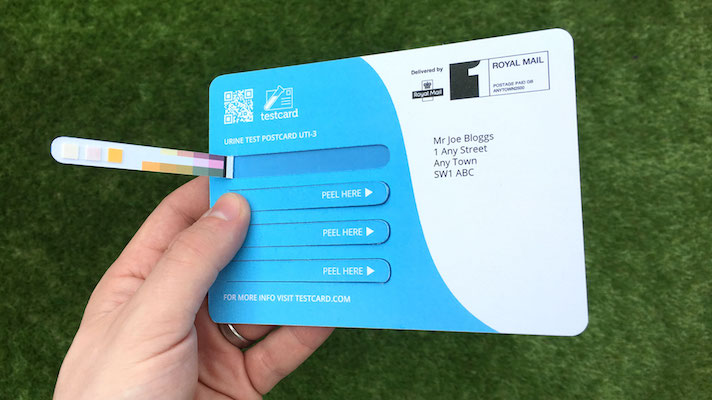
What happened
TestCard, a London-based digital health company, has raised $1.7 million (£1.25 million) in seed funding from Neo Ventures, a small Bulgarian investment firm focused on accelerating European startups.
The company is entering the rapidly-maturing smartphone-enabled home urinalysis market, with plans to release its first product in the UK this year. The product is a physical postcard with an embedded, pull-out urine testing strip, along with a smartphone app that can scan the postcard and deliver a result. The initial launch will include UTI and pregnancy testing, and future versions of the product will include prostate health screening, pre-eclampsia and gestational diabetes, and kidney health.
The test produces a result that’s easy for a patient to read — pregnant or not pregnant, UTI or not UTI. But the more technical results — leukocyte or nitrate counts — are also available in the app for a doctor to view.
Why it matters
While TestCard is not yet cleared by the FDA, it does have a CE Mark and will be among the first companies to bring a product like this to the UK. In addition to plans for a direct-to-consumer product, the company already has a signed agreement to trial the product at a Yorkshire NHS Trust and says several hundred GPs have pre-registered to use it.
Dr. Andrew Botham, the company’s chief scientific officer who cofounded TestCard with CEO Luke Heron, said telemedicine is another major target, including working with chatbot-based services like Babylon in the UK.
“We’ve been contacted by a lot of doctor on demand services,” he told MobiHealthNews. “Those services are absolutely great … but they have some questions around how they actually apply the prescribing of antibiotics, especially. They’re engaging entirely in electronic interaction and prescribing entirely on a discussion that’s happening electronically. You can imagine if you build an empirical measure, that concern could go away. You could tack on a system where a person has a test card, does a test, and based on those results they’re able to generate an electronic interaction with a care professional, who is then able to give advice based on that.”
What is the trend
Although this space has been an area of interest in digital health for a number of years, the last few months it seems to have ramped up considerably. Just this year, Healthy.io, inui Health (formerly Scanadu), and Scanwell have all received FDA clearances. Scanwell’s is perhaps most similar to TestCard, as it focuses specifically on UTI.
However, it seems likely that all the competitors will be able to eventually flesh out a full line of tests. So competition in the market could shake out to usability.
There’s also likely to be plenty of room in the market, at least at first. These at-home tests have applications as provider-prescribed tools, direct-to-consumer tests, or as components of telemedicine solutions. They also have tremendous potential in developing markets around the world.
On the record
Botham says TestCard’s mission is to make testing easy and empowering to the patient.
“Part of it's about accessibility, but part of it’s about confidence,” he said. “The whole process the test takes them through — including just being in a postcard format which is a very familiar thing — the whole thing fills them with confidence to know they are producing an accurate and reliable result. The fact that people carry their phones around all the time, they control their lives with their phones, again gives them a certain amount of ownership. They carry their health record around with them so that rather than these tests being snapshot tests, they start to become an integrated health record.”


















